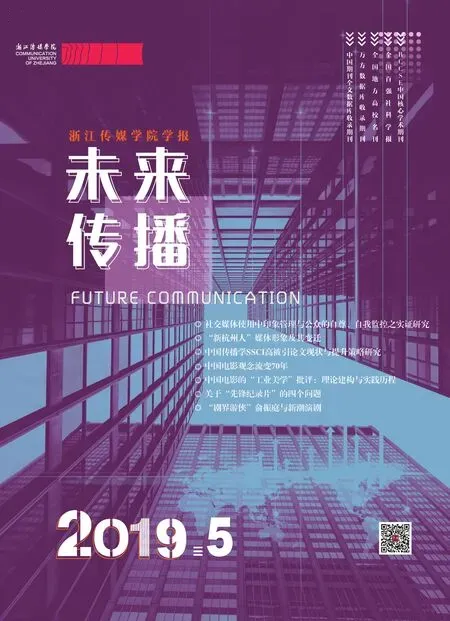英文目录与重点文章英文摘要
AnEmpiricalStudyofImpressionManagement,PublicSelf-EsteemandSelf-MonitoringintheUsageofSocialMedia
Niu Jing & Liu Cuihong
In real communication, self-esteem and self-monitoring are important factors that affect personal impression management. This paper discusses the factors that affect the motivation and construction of personal impression in the interpersonal communication on social media. SPSS and AMOS were used for the analysis of the correlation, multivariate variance and structural equation modeling. It is found that self-esteem has a positive predictive effect on the impression motivation of the public WeChat circle of friends, but has no direct impact on impression construction; the relationship between self-monitoring and impression management is not significant in the WeChat circle of friends. This finding indicates that users' impression management on social media is different from that under the real environment.
TheMediaImageof"NewHangzhouers"andItsChanges
Cheng Dexing
Based on 40 news reports of "new Hangzhouers" from 2008 to 2018, this paper investigates the media image of "new Hangzhouers" and the change of group media image in the past 11 years. In the news report, "new Hangzhouers" are still mostly presented as "outside" group labels such as "out of town" and "migrant workers", which are the "other" in the news media report. However, the media image of "new Hangzhouer" has gone through the changes from weak to strong, from the vulnerable migrant workers who are cared about to the "new citizens" who actively integrate the city and play the master spirit. The concept of "new Hangzhouer" attempts to break people's original emotional attachment to the place of birth or ancestral home, and construct a kind of postnatal regional identity. However, influenced by the traditional Chinese farming culture, the identity of "new Hangzhouers" is not accepted by most Hangzhou immigrant groups, this intensifies the division of identity within the group, and integration and assimilation do not work.
ResearchontheStatusQuoandPromotionStrategyofSSCIHighlyCitedPapersinChineseCommunicationStudies
Cui Bo, Li Chen & Yao Kaibo
This paper does the research on 52 highly-cited papers selected from core collection database in Web of Science and analyzes the internal and external characteristics by applying semantic network technology. Based on the analysis, the paper reflects the problems that the discipline of journalism and communication faces in China and proposes corresponding promotion strategies.
TheSeventy-YearChangeofChineseFilmConcept
Chen Xuguang & Liu Yiyi
The concept of a film means the reflection on its nature and function. The core is to understand, and answer the questions like "what is film" and "what is film"; that is, the nature, noumenon and function of the film. Within the 70 years since the founding of the People's Republic of China, influenced by the development of culture, aesthetics, society, and technology, the concept of Chinese film has been evolving in multiple dimensions, affecting the overall creative thinking, critical vision, industrial dimension and industrial system of the film industry. From the "theory of function or tool" and "national film" in the early days of the People's Republic of China to the wave of film industrialization and the new century industrialization, and the concept of "film industry aesthetics" occurring in recent years, the author tries to explore the internal relationship between films and the changes of reality, society and culture over the past 70 years and the internal logic concerned. This part focuses on the diversified forms and development trend of Chinese films.
"IndustrialAesthetics"CriticismofChineseFilms:TheoreticalConstructionandPracticalProcess
Zhou Qiang
The aesthetics of Chinese film industry emerged and developed rapidly in the context of the new era, which caused many concerns and disputes, and became the leading theory in the field of film research. The theoretical characteristics of Chinese film industry aesthetics are mainly manifested in the features of the theoretical construction process and the connotation of the existing theoretical system. The process of its construction has formed three stages from "starting from appearance" to "dispute perfection" and then to "initial system formation". Its "basic principle" embodies the idea of "integration and unity" that "industry" and "Aesthetics" move from opposite to complementary. It is a full exploration and innovation of the essential attributes of films in the sense of Film Ontology. The critical practice of Chinese film industry aesthetics includes not only the overall observation and analysis of science fiction films and "Happy Mahua" series comedies, but also the new and cutting-edge reviews of some phenomenal films. These critical texts provide useful enlightenment for the development of Chinese film industry aesthetics from the aspects of the perfection of producer-centered system, the theoretical construction of imaginative industry, and the presentation of Chinese characteristic discourse.
FourQuestionsforVanguardDocumentary
Nie Xinru
The article challenges the four articles on "vanguard documentary" published in the "Documentary Research" column of the 11th issue of the journal, Contemporary Film in 2018, pointing out that the four articles touch on some fundamental problems of documentary theory, such as whether documentary is a pure art work or not. Does documentary need social significance? And can we deduce the possibility of "fiction" from Wiltov's "movie eyes" theory? The discussion of these problems will help us to further understand the value of the documentary.
"DramaRanger"YuZhentingandNewDrama
Liu Xiaozhen
Yu Zhenting, known as "the ranger of the drama circle", led the new trend in the great transformation of Beijing Opera circle at the end of Qing Dynasty and the beginning of the Republic of China, took the lead in the new trend drama activities such as co-performance of men and women, night play, new fashion play, new fashion class, etc., and eventually became a key figure. It is found that Yu Zhenting, with a keen sense of business and excellent communication ability, can freely switch between the leaders, directors, dispatchers, actors and many other identities, and successfully set off a new trend of Beijing Opera. Although he sometimes sought quick success and instant profit, he has made great contribution to the prosperity and development of Beijing Opera.

